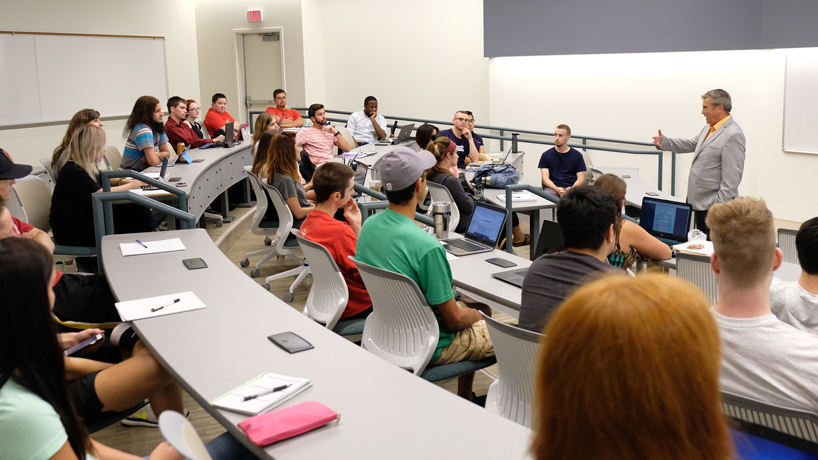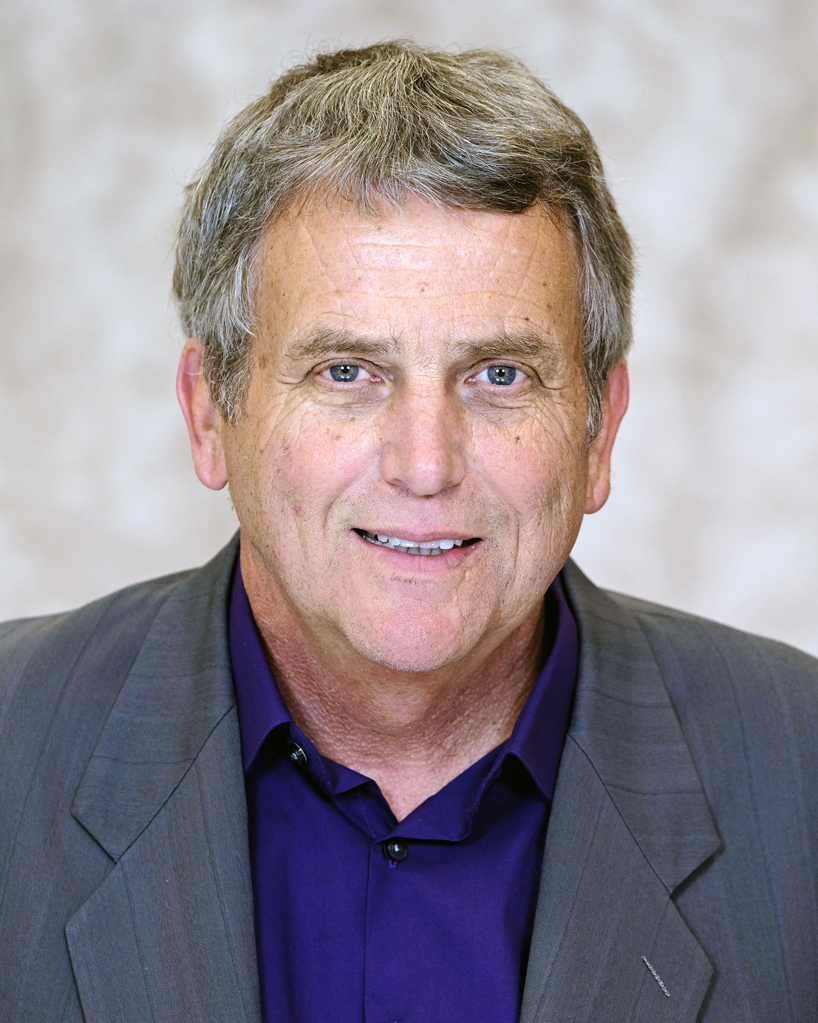
Teaching Professor John Palmer (standing) leads courses in global leadership and management at UMSL and chairs the Entrepreneur Curriculum Committee. (Photos by August Jennewein)
Teaching Professor John Palmer hopes new students choose the University of Missouri–St. Louis for the same reason he did in 2017: the growing entrepreneurship program.
At the time, he was teaching at Argosy University in Chicago and serving as the department chair for the university’s Graduate School of Business and Management. But looking for a new challenge, he turned his attention to UMSL, where he could help develop an entrepreneurship curriculum in an ecosystem ripe for new business ventures.
“The direction that UMSL is going with entrepreneurship was one of the main drivers for me coming here,” Palmer said. “It’s been my interest throughout my career on the academic and research side of things. I’ve also had some successful ventures of my own and worked quite a bit in a consulting capacity with other companies and small startups. It was a really great fit. St. Louis and UMSL are positioned to move forward with entrepreneurship. It was a good move for me all the way around.”
Since arriving at UMSL a little over a year ago, Palmer has worked with faculty and staff across the university to establish an entrepreneurship degree track, which is currently in the approval process. He chairs an interdisciplinary curriculum committee and is working to build an entrepreneurship emphasis area within the College of Business Administration.
When developing course offerings, Palmer and the committee members have worked to align curriculum with successful entrepreneurial initiatives on campus, like UMSL Accelerate, the ED Collabitat and the Entrepreneur Quest Student Accelerator. They have even adopted UMSL Accelerate’s “educate, innovate, collaborate” model.
“We are developing 21st century, state-of-the-art programs that are both timely and second to none,” Palmer said. “Our focus is on providing applied, hands-on experiences, leading to successful venture creation in organizations, whether they be small startups, social enterprises or large corporations. We are also focused on the development of the whole person in key competency areas in high demand by employers and areas essential for individuals to become successful entrepreneurs.”
Those key competency areas include innovation, market disruption, resilience, ethical leadership and developing an entrepreneurial mindset. Palmer believes a course on the books for the spring semester will address all of those essential elements.
In its first UMSL offering, Palmer’s “Experiential Entrepreneurship” course will offer free instructional materials and provide opportunities for $3,000 business grants. The class is sponsored by the National Science Foundation’s acclaimed Innovation Corps program and held in conjunction with a section offered at Missouri University of Science and Technology.
“The course has a revolutionary curriculum,” Palmer said. “There are really some exciting opportunities here as well as collaboration with students at S&T. It’s a good mix of people. We have entrepreneurs from the community who will be coming in, and they will be overseeing some of these projects, too. So students will have a chance to interact with some of those individuals.”
Students do not need a business idea to enroll in the class, and there are no prerequisites. Other entrepreneurship courses offered next semester include “Introduction to Entrepreneurship,” “Entrepreneurship and Small Business Management” and the “Accelerate Capstone,” which will include the finalists from the first EQ Student Accelerator program.
Palmer encourages all students to consider entrepreneurship courses, even if they are not interested in pursuing an individual business idea.
“When we go out and talk to business people in the community, they are always telling us that students come out and generally have adequate technical skills but are often lacking abilities in collaboration, creative thinking, overcoming obstacles, identifying opportunity and interpersonal communication,” he said. “Small businesses and big corporations want people who are innovative, who are go-getters and disruptive in a good way.”
Palmer developed his entrepreneurial mindset early as his family owned agribusiness and restaurant operations and his grandmother ran a farming equipment business she started in the 1950s.
“At the time, she was one of the first females to have a business in that industry,” Palmer said. “I grew up in that business. I’ve always been around entrepreneurs and have always been entrepreneurial.”
His early inspirations live on as motivations in his research. Palmer and his collaborators are currently investigating the influences of gender role in entrepreneurial intentions. In a variety of data sets, they’ve found that most women do not receive the same level of social encouragement to become entrepreneurs as men. As a result, entrepreneurial intentions are usually higher among men. However, he said education serves as an equalizer.
“Females who take entrepreneurship courses and are exposed to entrepreneurial education are able to fill this gap,” Palmer said. “All else is equal – females with entrepreneurial education are just as likely as males to want to start businesses.”















